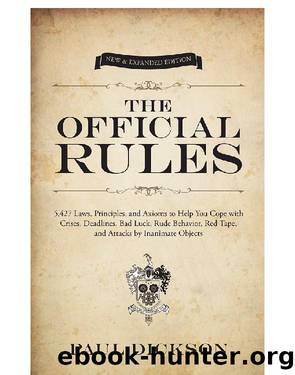The Official Rules by Paul Dickson

Author:Paul Dickson
Language: eng
Format: epub
Publisher: Dover Publications
Published: 2014-12-15T00:00:00+00:00
M
Ma Bellâs Public Relations Principle. We donât care. We donât have to. (Bumper sticker cited by John Stephen Smith, Lincoln, Nebraska. This law has been transferred to later monopolies, namely cable television companies.)
Macdonaldâs Moral. You have to be sincere to sell out; itâs like making moneyâif your heartâs not in it, the customer . . . sees through the imposture. (Dwight Macdonald, quoted in The New York Times Book Review, November 21, 1982. It was invoked in the context of a story about Delmore Schwartz trying to write a âpiece of junkâ to win a $1,000 prize in a contest.)
MacEwan Principle, The. All benefits conferred on humanity by new inventions and discoveries will be applied in such a way as eventually to achieve (by other means) the same standard of misery as before. (Douglas M. C. MacEwan, Kent, England.)
Macfarlaneâs Law. When a number of conflicting theories coexist, any point at which they all agree is the one most likely to be wrong. (G. Macfarlane, Howard Florey, the Making of a Great Scientist, Oxford, 1979; from David L. Cowen, Jamesburg, New Jersey.)
MacLeishâs Literary Law. If you write a novel about fruitcakes, you will hear from fruitcakes. (Rod MacLeish, quoted in the Washington Post, May 24, 1979. The discovery was occasioned by his novel The Man Who Wasnât There, Random House, 1976, about a man being driven insane. He got a call from a man in Idaho, who claimed MacLeish had stolen his life story and demanded a check for $9 million.)
MacPhersonâs Law. No matter how good a bargain you have purchased, the first person you show it to could have got it cheaper if you had only told them. Corollary: If you ask the same people before you purchase, their supply has just run out, and they âcanât get them for love or money.â (Ian MacPherson, London, England.)
MacPhersonâs Working Formula. The number of interruptions received during a work period is proportionate to the square of the number of employees occupying an officeâthus, one person in an office = one interruption per hour; two in an office = four interruptions per hour; three people = nine per hour, etc. (Ian MacPherson, Regina, Saskatchewan.)
Macraeâs Law. In modern conditions of high elasticity of both production and substitution, we will generally create a temporary but large surplus of whatever the majority of decision-influencing people five or ten years earlier believed was going to be in most desperately short supply. This is because the well-advertised views of the decision-influencers tend to be believed by both profit-seeking private producers and consensus-following governments, and these two then combine to cause excessive production of precisely the things that the decision-influencers had been saying would be the most obviously needed. (Walter Macrae, The Economist, October 26, 1975; from Joseph C. Goulden.)
Maddocksâs Law of Thermopolitical Dynamics. If a less powerful person or group makes things hot for a more powerful person or group, that person or group is likely to make things an awful lot hotter for junior. (Melvin Maddocks, in a Christian Science Monitor article on whistle-blowers, February 20, 1981; from Steven R.
Download
This site does not store any files on its server. We only index and link to content provided by other sites. Please contact the content providers to delete copyright contents if any and email us, we'll remove relevant links or contents immediately.
Zero to IPO: Over $1 Trillion of Actionable Advice from the World's Most Successful Entrepreneurs by Frederic Kerrest(4568)
Machine Learning at Scale with H2O by Gregory Keys | David Whiting(4313)
Never by Ken Follett(3954)
Harry Potter and the Goblet Of Fire by J.K. Rowling(3856)
Ogilvy on Advertising by David Ogilvy(3622)
Shadow of Night by Deborah Harkness(3367)
The Man Who Died Twice by Richard Osman(3077)
Book of Life by Deborah Harkness(2938)
The Tipping Point by Malcolm Gladwell(2921)
Will by Will Smith(2919)
Purple Hibiscus by Chimamanda Ngozi Adichie(2853)
0041152001443424520 .pdf by Unknown(2845)
My Brilliant Friend by Elena Ferrante(2831)
How Proust Can Change Your Life by Alain De Botton(2814)
How to Pay Zero Taxes, 2018 by Jeff A. Schnepper(2655)
Hooked: A Dark, Contemporary Romance (Never After Series) by Emily McIntire(2553)
Rationality by Steven Pinker(2363)
Can't Hurt Me: Master Your Mind and Defy the Odds - Clean Edition by David Goggins(2339)
Borders by unknow(2313)
